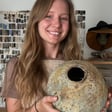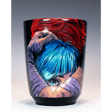
#357 Feral Maximalism: The Pottery Journey of Casey Stelter
In this episode of 'Shaping Your Pottery' featuring Casey Stelter, a potter known for her work tailored to the 'feral maximalist', listeners get valuable insights into finding one's passion and voice in pottery. Casey shares her journey from exploring pottery as a hobby with her husband to committing full-time to her craft amidst the challenges of a physical job and moving states. She emphasizes the importance of making work you love, particularly highlighting her transition from wheel throwing to slip casting to focus on decoration due to physical constraints. Casey underlines the pivotal role of community in growth and navigating the pottery business, recounting the supportive networks in Denver and online that have contributed to her success. This episode also delves into Casey's approach to breaking conventional pottery rules, her creative processes, and the significance of creating a local and online presence for business growth. Casey's story is a testament to the importance of perseverance, authentic self-expression, and community support in crafting a fulfilling pottery career. You can learn more about Casey by checking out her instagram @shewolfstudios
Take this Free Quiz to see how close you are to finding your pottery voice click here to take the quiz shapingyourpottery.com/quiz
00:00 Introduction to Casey Stelter and Her Pottery Journey 01:06 The Importance of Community in Pottery 02:29 Casey's Personal Journey into Pottery 03:08 Overcoming Frustration and Taking Breaks 04:51 The Evolution of Casey's Pottery Style 06:25 The Concept of Feral Maximalism 11:15 The Business Side of Pottery 16:16 Discovering Your Unique Voice in Pottery 20:54 Final Thoughts and Advice for Aspiring Potters


